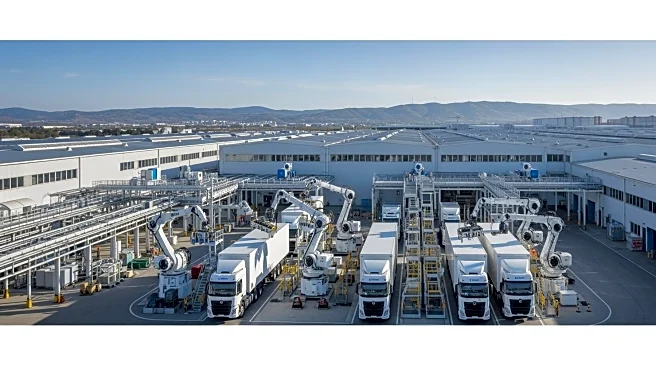What's Happening?
Swedish truck manufacturer Scania has inaugurated a new industrial hub in Rugao, Jiangsu Province, China, marking a significant expansion in its global operations. This facility, covering 800,000 square
meters, is one of Scania's largest investments, with a total cost of €2 billion. It is designed to produce up to 50,000 vehicles annually, serving both the Chinese market and selected export markets in Asia. The hub is notable for its commitment to sustainability, operating almost entirely on renewable energy sources such as locally produced biogas and certified green electricity. This aligns with Scania's decarbonization targets. The facility also creates approximately 3,000 new jobs locally. Scania's presence in China spans 60 years, and this new hub strengthens its footprint in the world's largest truck market.
Why It's Important?
The establishment of Scania's industrial hub in China is a strategic move that enhances its ability to compete in the global truck market, particularly in Asia. By producing locally, Scania can offer faster deliveries and more tailored specifications to meet regional demands. The hub's focus on sustainability sets a new benchmark for industrial operations, potentially influencing other manufacturers to adopt similar practices. This expansion also allows Scania to tap into China's innovation landscape, particularly in transport, connectivity, autonomy, and electrification, which are crucial for the future of the automotive industry. The investment signifies Scania's long-term commitment to the Chinese market, which is pivotal for its global growth strategy.
What's Next?
Scania plans to begin deliveries from the Rugao facility by late 2025, with the launch of its 'Next Era' product line in the first half of 2026. This new range is specifically developed for China's competitive long-haul and volume segment, integrating local digital ecosystems and technologies. The facility will also serve as a research and development center, fostering collaboration with Chinese partners to develop innovative transport solutions. As Scania integrates unique Chinese technologies into its offerings, it may set a precedent for other global manufacturers seeking to enhance their competitiveness in the region.
Beyond the Headlines
Scania's investment in China reflects broader trends in the automotive industry, where companies are increasingly focusing on sustainability and local production to meet regional demands. The hub's reliance on renewable energy sources highlights the growing importance of environmental considerations in industrial operations. Additionally, the integration of local technologies into Scania's global offerings could lead to a shift in how automotive companies approach product development, emphasizing adaptability and regional customization.










